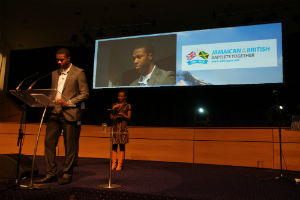
Gale Richards, Dave Ellis and Marcus Hunter, all descendants of the Windrush generation of Jamaicans who came to the UK following the Second World War, gave the background to the Jamaican British relationship, and why it is worth celebrating. They highlighted the events which have been organised to mark the bicentenary this year.
‘We pray that you will be able to attend at least one of these bicentenary events as a way of celebrating the inspiring, enduring and fruitful relationship between British and Jamaican Baptists that much can be learned from,’ said Marcus.
Gale added, ‘Do remember that in this year 2014, we can celebrate this 200-year anniversary because of the work begun by pioneers like George Liele and John Rowe. The challenge, as ever, is to nurture tomorrow’s pioneers, to further extend God’s Kingdom, here on earth.’
There was a focus on pioneering throughout the morning. Jenni Entrican, the Baptist Union Vice President who opened and closed the session, shared how she had discovered she could call herself a pioneer through Jacob’s Well, the church she leads. ‘I was treading new ground, I was prepared to try out new ideas which may or may not work, because God was asking it of me, for the sake of his kingdom, for justice, for mission, because that is who he is.’
David Kerrigan outlined the five points of a pioneering spectrum, explaining that the principles of reaching closed countries overseas were similar to reaching closed communities on these shores.
The first point was prayer: he reflected on how Nepal had been a closed, Hindu kingdom 100 years ago. ‘So many people prayed for Nepal,’ he said. ‘We can pray for closed communities.
The second point was proximity. ‘If you believe God is calling you to work among a closed group of people, you can signal your intentions by going as close as possible.’ He shared a how a hospital had been set up close to the Nepal border in India in the 1920s, which would ultimately help provide a foothole in the country.
The third point was practicality. ‘Recognise the key moments when God give the opportunity for practical help’
The fourth was presence, being there; and the fifth proclamation. ‘The role of pioneers is to begin this process; the role of God is to bring it to fulfilment,’ said David.
Part of the session involved breaking off into small groups to discuss the question posed in a sketch comparing two nurse stories – one a nurse in Manchester, the other Tunisia. Why does only one end up being called a missionary? Several stories about pioneering were fed back into the session through roving mics.
Simon Goddard explained a little about the Pioneer Collective, which seeks to release 400 Baptist pioneers in the next five years. Pioneers 'go to where the church isn't, do what Jesus does, and see what happens’. Pioneering was part of our Baptist heritage.